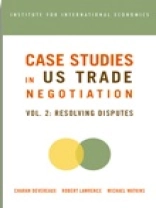Between 1992 and 2000, US exports rose by 55 percent. By the year 2000, trade summed to 26 percent of US GDP, and the United States imported almost two-thirds of its oil and was the world’s largest host country for foreign investors. America’s interest in a more open and prosperous foreign market is now squarely economic. These case studies in multilateral trade policymaking and dispute settlement explore the changing substance of trade agreements and also delve into the negotiation process—the who, how, and why of decision making. These books present a coherent description of the facts that will allow for discussion and independent conclusions about policies, politics, and processes. Volume 2 presents five cases on trade negotiations that have had important effects on trade policy rulemaking, as well as an analytic framework for evaluating these negotiations.
O autorze
Robert Z. Lawrence was a senior fellow and also the Albert L. Williams Professor of Trade and Investment at the John F. Kennedy School of Government at Harvard University. He served as a member of President Clinton’s Council of Economic Advisers from 1999 to 2000.Charan Devereaux is a senior researcher at the John F. Kennedy School of Government’s Trade and Negotiations Program and the Harvard Law School Program on Negotiation, where she writes on international trade issues.Michael D. Watkins is a professor of practice in organizational behavior at INSEAD, Fontainebleau. He is also founding partner of Genesis Advisers, a leadership strategy consultancy. He is the author of The First 90 Days: Critical Success Strategies for New Leaders at all Levels (2003) and Breakthrough Business Negotiation: A Toolbox for Managers (Jossey-Bass, winner of the CPR Institute prize for best negotiation book in 2002).












